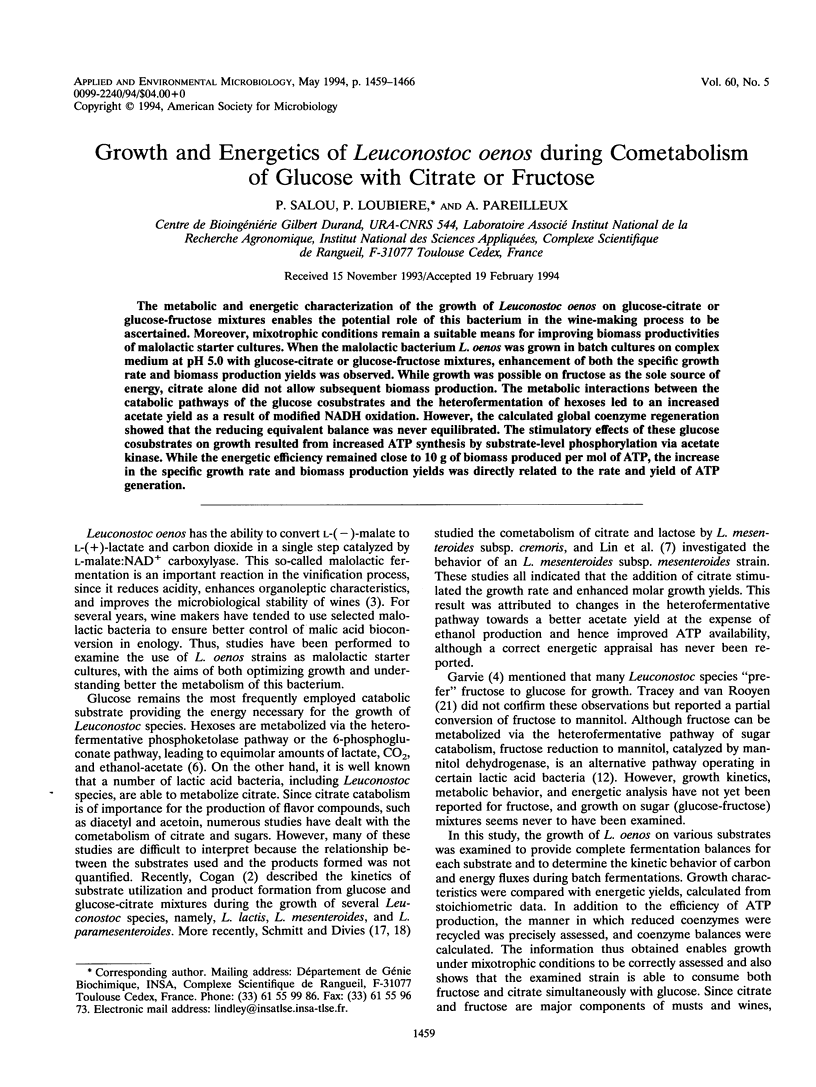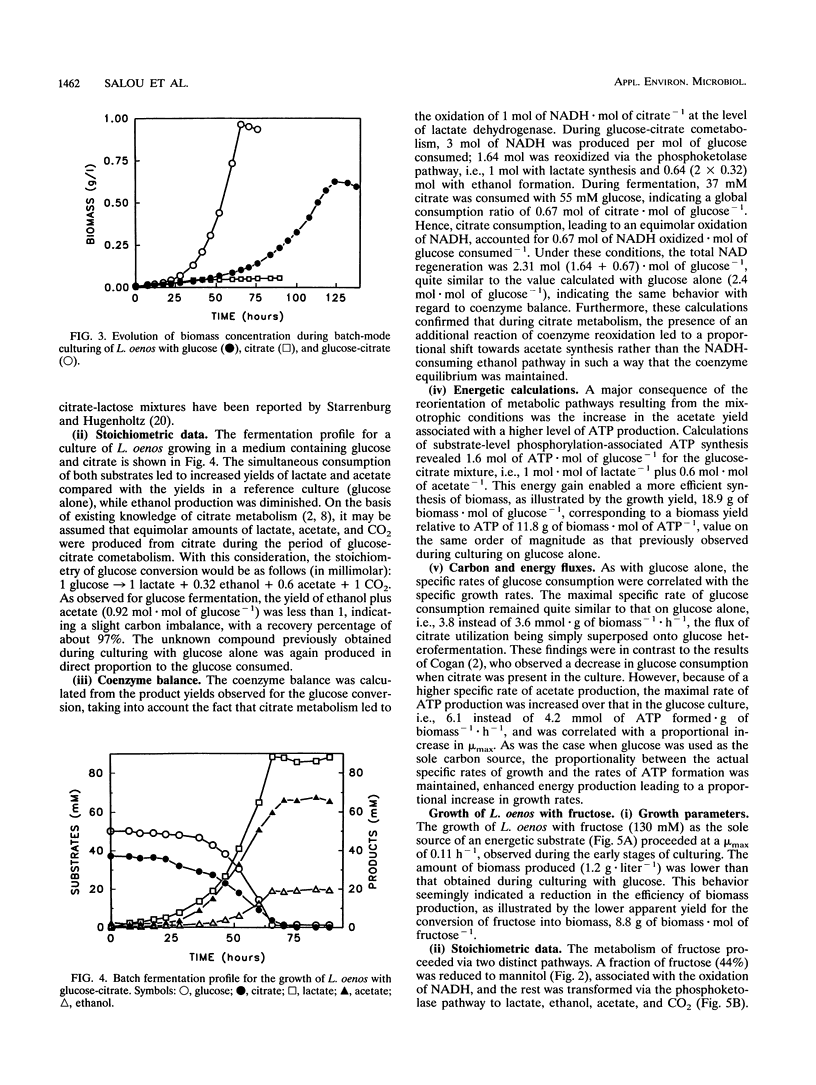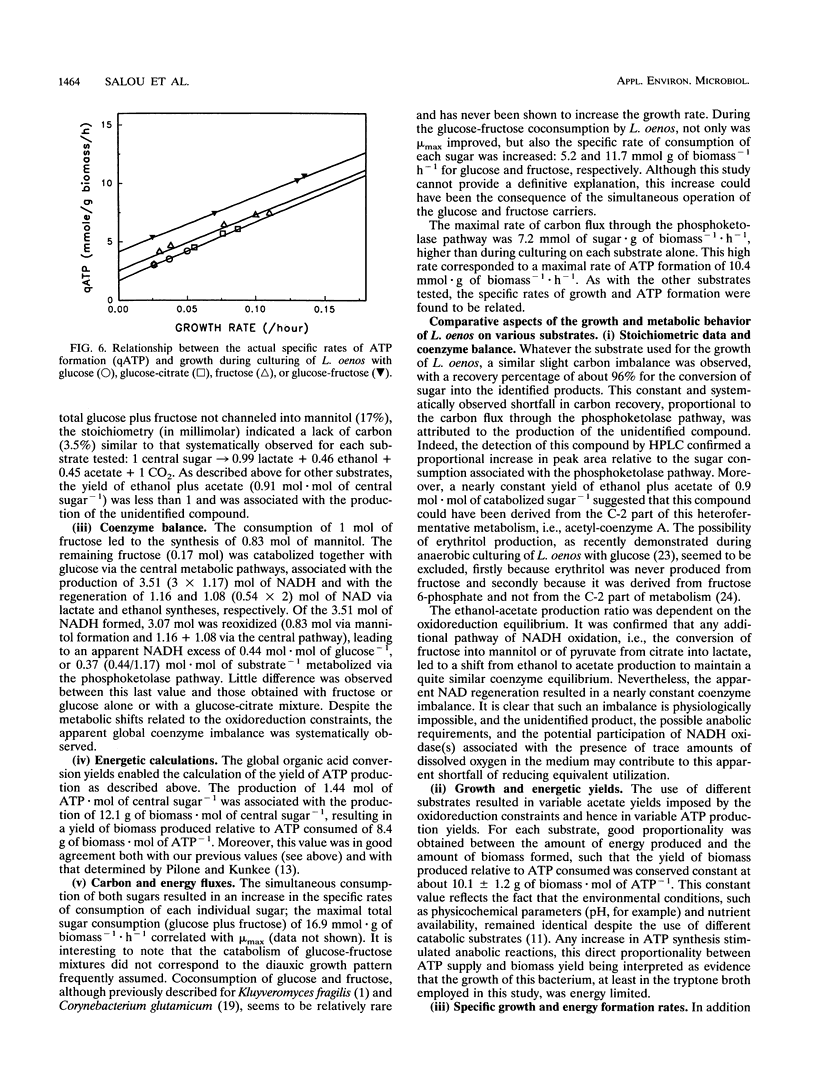Abstract
The metabolic and energetic characterization of the growth of Leuconostoc oenos on glucose-citrate or glucose-fructose mixtures enables the potential role of this bacterium in the wine-making process to be ascertained. Moreover, mixotrophic conditions remain a suitable means for improving biomass productivities of malolactic starter cultures. When the malolactic bacterium L. oenos was grown in batch cultures on complex medium at pH 5.0 with glucose-citrate or glucose-fructose mixtures, enhancement of both the specific growth rate and biomass production yields was observed. While growth was possible on fructose as the sole source of energy, citrate alone did not allow subsequent biomass production. The metabolic interactions between the catabolic pathways of the glucose cosubstrates and the heterofermentation of hexoses led to an increased acetate yield as a result of modified NADH oxidation. However, the calculated global coenzyme regeneration showed that the reducing equivalent balance was never equilibrated. The stimulatory effects of these glucose cosubstrates on growth resulted from increased ATP synthesis by substrate-level phosphorylation via acetate kinase. While the energetic efficiency remained close to 10 g of biomass produced per mol of ATP, the increase in the specific growth rate and biomass production yields was directly related to the rate and yield of ATP generation.
Full text
PDF







Selected References
These references are in PubMed. This may not be the complete list of references from this article.
- Kandler O. Carbohydrate metabolism in lactic acid bacteria. Antonie Van Leeuwenhoek. 1983 Sep;49(3):209–224. doi: 10.1007/BF00399499. [DOI] [PubMed] [Google Scholar]
- Loubiere P., Salou P., Leroy M. J., Lindley N. D., Pareilleux A. Electrogenic malate uptake and improved growth energetics of the malolactic bacterium Leuconostoc oenos grown on glucose-malate mixtures. J Bacteriol. 1992 Aug;174(16):5302–5308. doi: 10.1128/jb.174.16.5302-5308.1992. [DOI] [PMC free article] [PubMed] [Google Scholar]
- Pirt S. J. Maintenance energy: a general model for energy-limited and energy-sufficient growth. Arch Microbiol. 1982 Dec 3;133(4):300–302. doi: 10.1007/BF00521294. [DOI] [PubMed] [Google Scholar]
- Pirt S. J. The maintenance energy of bacteria in growing cultures. Proc R Soc Lond B Biol Sci. 1965 Oct 12;163(991):224–231. doi: 10.1098/rspb.1965.0069. [DOI] [PubMed] [Google Scholar]
- Starrenburg M. J., Hugenholtz J. Citrate Fermentation by Lactococcus and Leuconostoc spp. Appl Environ Microbiol. 1991 Dec;57(12):3535–3540. doi: 10.1128/aem.57.12.3535-3540.1991. [DOI] [PMC free article] [PubMed] [Google Scholar]
- Veiga-Da-Cunha M., Firme P., Romão M. V., Santos H. Application of C Nuclear Magnetic Resonance To Elucidate the Unexpected Biosynthesis of Erythritol by Leuconostoc oenos. Appl Environ Microbiol. 1992 Jul;58(7):2271–2279. doi: 10.1128/aem.58.7.2271-2279.1992. [DOI] [PMC free article] [PubMed] [Google Scholar]
- Veiga-da-Cunha M., Santos H., Van Schaftingen E. Pathway and regulation of erythritol formation in Leuconostoc oenos. J Bacteriol. 1993 Jul;175(13):3941–3948. doi: 10.1128/jb.175.13.3941-3948.1993. [DOI] [PMC free article] [PubMed] [Google Scholar]



